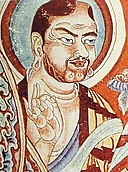File:Central Asian Buddhist Monks.jpeg
Central_Asian_Buddhist_Monks.jpeg (470 × 591 pixels, file size: 173 KB, MIME type: image/jpeg)
Captions
Captions
Summary
[edit]| DescriptionCentral Asian Buddhist Monks.jpeg |
A Caucasian Central Asian monk, possibly an Indo-European Sogdian or Tocharian, teaching an East Asian monk, perhaps a Turkic Uyghur or Chinese, on a 9th-century AD fresco from the Bezeklik Thousand Buddha Caves near Turfan, Xinjiang, China. A detail from Praņidhi scene no. 5 in Temple no. 9. The book that this painting is reproduced in has full descriptions of these two figures. Relevant details, along with the German descriptions, are found below.
In "Tafel 19" of his Chotscho: Facsimile Reproduction of Important Findings of the First Royal Prussian Expedition to Turfan in East Turkistan] (Berlin, 1913), Albert von le Coq identified the figure on the right as a "Tocharer" (i.e. Tocharian) and the figure on the left as "Ostasiate" (i.e. East Asian). In other murals of the Bezeklik Budda Caves, however, foreign-looking Caucasian men have been identified as ethnic Sogdians (an Eastern Iranian people). For instance, Scene No. 6 in Temple 9, in the same temple as the aforesaid mural, modern scholars have identified the kneeling men draped in silk robes as Sogdians (see Gasparini, Mariachiara. "A Mathematic Expression of Art: Sino-Iranian and Uighur Textile Interactions and the Turfan Textile Collection in Berlin," in Rudolf G. Wagner and Monica Juneja (eds), Transcultural Studies, Ruprecht-Karls Universität Heidelberg, No 1 (2014), pp 134-163. ISSN: 2191-6411. See also endnote #32 for further information on source material.) |
|||
| Date |
8th century date QS:P,+750-00-00T00:00:00Z/7 |
|||
| Source | Chotscho: Facsimile Reproduction of Important Findings of the First Royal Prussian Expedition to Turfan in East Turkistan, Berlin, 1913. A catalogue of the findings of the Second German Turfan Expedition (1904–1905) led by Albert von Le Coq, containing colour reproductions of the murals, which were destroyed in WW2. (National Institute of Informatics – Digital Silk Road Project Digital Archive of Toyo Bunko Rare Books) | |||
| Author | of the paintings - Unknown. Of the book, Albert von Le Coq. | |||
| Other versions |
|
|
This is a faithful photographic reproduction of a two-dimensional, public domain work of art. The work of art itself is in the public domain for the following reason:
The official position taken by the Wikimedia Foundation is that "faithful reproductions of two-dimensional public domain works of art are public domain".
This photographic reproduction is therefore also considered to be in the public domain in the United States. In other jurisdictions, re-use of this content may be restricted; see Reuse of PD-Art photographs for details. | |||||
File history
Click on a date/time to view the file as it appeared at that time.
| Date/Time | Thumbnail | Dimensions | User | Comment | |
|---|---|---|---|---|---|
| current | 12:25, 27 March 2005 |  | 470 × 591 (173 KB) | Beta m common (talk | contribs) | 9th century fresco from Bezeklilk, Tarim Basin. {{PD-art}} |
You cannot overwrite this file.
File usage on Commons
The following 8 pages use this file:
File usage on other wikis
The following other wikis use this file:
- Usage on ar.wikipedia.org
- Usage on ast.wikipedia.org
- Usage on az.wikipedia.org
- Usage on ba.wikipedia.org
- Usage on bg.wikipedia.org
- Usage on bjn.wikipedia.org
- Usage on bn.wikipedia.org
- Usage on bs.wikipedia.org
- Usage on bxr.wikipedia.org
- Usage on ca.wikipedia.org
- Usage on cs.wikipedia.org
- Usage on cv.wikipedia.org
- Usage on da.wikipedia.org
- Usage on de.wikipedia.org
- Usage on de.wikivoyage.org
- Usage on el.wikipedia.org
- Usage on en.wikipedia.org
View more global usage of this file.
Metadata
This file contains additional information such as Exif metadata which may have been added by the digital camera, scanner, or software program used to create or digitize it. If the file has been modified from its original state, some details such as the timestamp may not fully reflect those of the original file. The timestamp is only as accurate as the clock in the camera, and it may be completely wrong.
| Camera manufacturer | Canon |
|---|---|
| Camera model | Canon PowerShot S110 |
| Exposure time | 1/80 sec (0.0125) |
| F-number | f/2.8 |
| Date and time of data generation | 16:46, 2 January 2005 |
| Lens focal length | 5.40625 mm |
| File change date and time | 16:46, 2 January 2005 |
| Y and C positioning | Centered |
| Exif version | 2.1 |
| Date and time of digitizing | 16:46, 2 January 2005 |
| Image compression mode | 3 |
| APEX shutter speed | 6.3125 |
| APEX aperture | 2.96875 |
| APEX exposure bias | 0 |
| Maximum land aperture | 2.9708557128906 APEX (f/2.8) |
| Subject distance | 0.158 meters |
| Metering mode | Pattern |
| Flash | Flash did not fire |
| Color space | sRGB |
| Focal plane X resolution | 7,766.9902912621 |
| Focal plane Y resolution | 7,741.935483871 |
| Focal plane resolution unit | inches |
| Sensing method | One-chip color area sensor |

